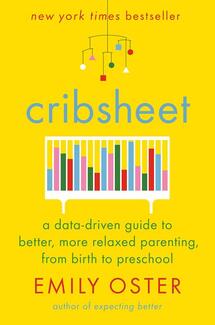 I just finished reading Cribsheet: A Data-Driven Guide to Better, More Relaxed Parenting, from Birth to Preschool by Emily Oster. It was sort of a meta-analysis of a bunch of published research and scientific studies on various parenting questions related to the early years. It was written by an economist (whose husband is also an economist) who loves to look at data and approaches a lot of publications with a healthy dose of skepticism. It was a concise tactical summary of each major area of early parenting and where there is enough quality evidence to suggest one approach is better than another and where there isn't. An important point is that throughout all the decisions she discusses, there is a large role for a parent's own preferences, and she points out how each child, parent, and family situation is different, and that usually is a much bigger determining factor than anything else. The book covered a lot of things I've read about in other places, and her list of references and books she refers to is pretty good. Below are my limited notes (my "crib sheet") on Cribsheet. Intro
Economist approach using data to parenting decisions in first 3 years Part 1 in the beginning 1 first 3 days Baths Circumcision Rooming in at hospital benefits not worth it so should get the sleep Short supplementation with formula to maintain weight ok Delay cord cutting good Vitamin K shot good 2 wait you want me to take it home Swaddling worth it Limit germ exposure in very beginning 3 take the mesh underwear home Part 2 the first year 4 breastfeeding Some health benefits for kids and mom 5 breastfeeding how to Skin to skin helps 6 sleep position and location Sleep in own bed in your room first 4 months then in its room 7 organize your baby Sleep schedule and nap dropping times 8 vaccination yes please 9 stay at home or at work No difference in effects to child 10 who should take care of baby Nanny or grandparent a little better earlier and daycare a little better later 11 sleep training Cry it out works scientifically and improves attachment and feeling of security and happiness for kids and parents Bedtime routine Key is consistency 12 beyond the boobs, solid food Offer variety Don’t give alternate if kid doesn’t want some food Part 3 from baby to toddler 13 physical milestones Late walking doesn’t predict anything bad Kids in winter sick 50% of time. Average cold lasts 14 days and kids get 6-8 per year 14 tv TV leads to bad outcomes Educational programs don’t do much Language delays from more access to phone 15 language development Late talking slightly predictive of later learning issues but not much 16 potty training Earlier u start, longer it takes to complete 17 discipline Positive parenting Age appropriate expectations 18 education Reading to child makes huge difference Ask open ended questions while reading Part 4 home front 19 internal politics Marriage gets worse after kids Unequal chore allocation Less intimacy Sleep huge determinant of marital happiness Marriage checkup and counseling 20 expansions Not much science on what’s optimal Quantity quality trade off Birth order matters. Later siblings get worse/less education/attention due to less time No differences in personality or harm to only children Large birth spacing better from older child 21 growing up and letting go Older kids harder problems Just do your best and try not to think too much about it References 123 magic The incredible years
0 Comments
Your comment will be posted after it is approved.
Leave a Reply. |
Archives
June 2024
Categories
All
Subscribe |
 RSS Feed
RSS Feed
